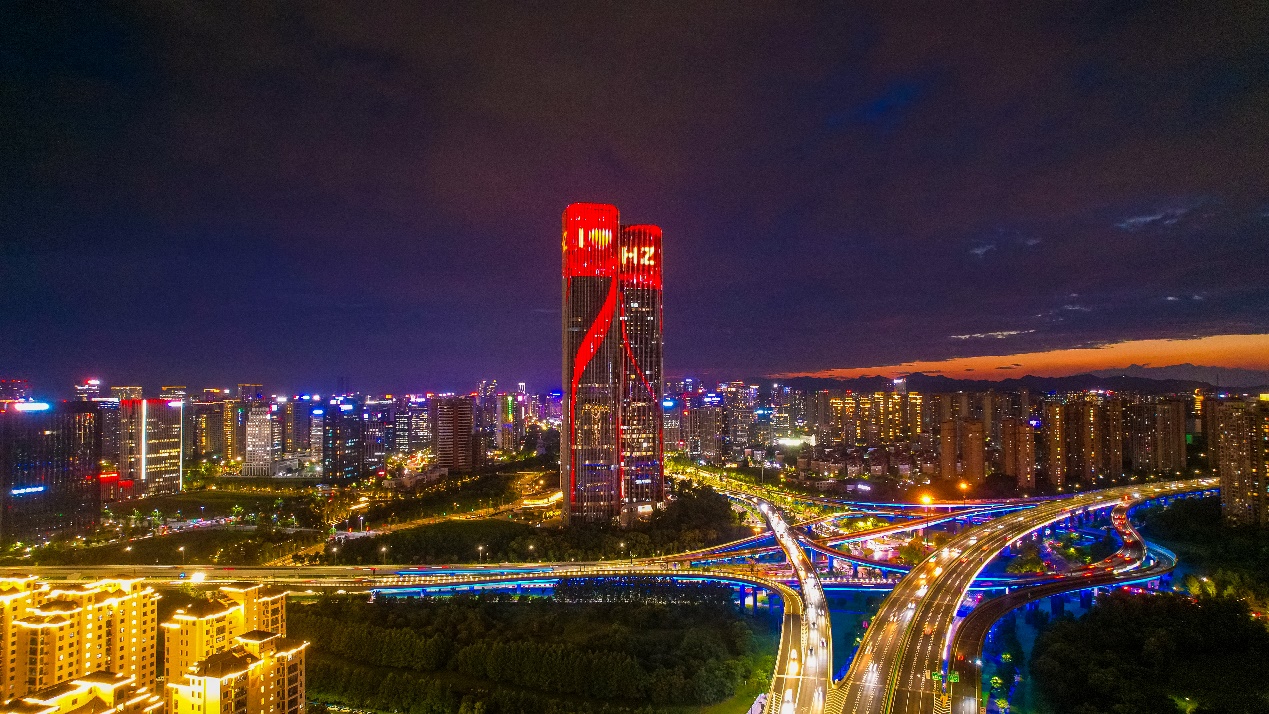HANGZHOU, China, June 24, 2024 – After the summer solstice passed, a large portion of China finds itself in the grip of a blistering summer season, accompanied by a surge in electricity demand. This period poses a critical challenge for many cities as they strive to guarantee a steady and dependable power supply.
For Hangzhou, the capital city of Zhejiang Province, a major economic powerhouse in eastern China, ensuring stable electricity supply is an especially formidable task.
Recently, Hangzhou has taken the lead in implementing 0.4 kilovolt low-voltage power supply reliability extension management across the province. This initiative aims to further optimize the construction of a new type of rapidly growing distribution network made up by photovoltaics, energy storage, charging stations, and other facilities that can flexibly serve the users.
This city, renowned for its West Lake, covers an area of over 16,000 square kilometers. It has a population of over 12 million permanent residents, with more than 1.8 million market entities operating within its boundaries. In 2023, the city’s total electricity consumption reached 98.7 billion kWh, and its GDP surpassed 2 trillion yuan.
However, it faces natural disadvantages against ensuring a stable power supply, such as high urban load density, frequent rainstorms and flooding, and a significant proportion of mountainous areas.
However, local residents and businesses do not have to worry about sudden power outages affecting the use of air conditioning or the operation of their production and business activities: The mega-city has already constructed a world-class urban power distribution network, boasting internationally advanced levels of power reliability.
In Hangzhou, the average annual power outage time per household in the core urban area is less than 30 seconds, and that for the whole city is less than 10 minutes. With the city’s power supply reliability rate reaching 99.9982%, Hangzhou’s power supply reliability can rival that of international metropolis such as New York, Vancouver, Tokyo, and Paris.
In 2023, Hangzhou successfully hosted the 19th Asian Games, showcasing to the world a city that is smart, futuristic, vibrant, and full of vitality. Hangzhou has also emerged as a popular host city for world-class major sporting events.
The high reliability of its electricity supply has become one of the decisive factors in hosting a smooth event. Take badminton competitions as an example, the reliable operation of electrical equipment and systems such as “Hawk-Eye,” timing and scoring, and court lighting are of utmost importance.
Meanwhile, as a hub for Chinese tech giants such as Alibaba, Hangzhou is seeing a growing concentration of high-tech enterprises. In the science and technology innovation corridor in west Hangzhou, a large number of scientific facilities, laboratories, and innovation platforms have settled in, placing extremely high demands on power supply reliability.
Reprogenix, a high-tech enterprise primarily engaged in cellular medical research, is located in the area. In the company’s workshops, the cells need to grow in incubators that simulate the human body environment.
“A cultivation cycle takes three months, and there can be no power interruptions during the process,” said the company’s representative Zhuang Dewei.
Today, as a demonstration area for a world-class power distribution network, Hangzhou has lifted the power supply reliability in the core areas of the Asian Games and the science and technology innovation corridor in its west to an impressive 99.9999%. For residents living in these areas, power outages are becoming a distant memory.
The significant improvement in Hangzhou’s power supply reliability can be attributed to a series of comprehensive, precise, and data-driven management initiatives implemented by the State Grid Hangzhou Power Supply Company with the goal of “providing uninterrupted electricity as the ultimate service”.
For example, the company has been increasing its investment of power grid in high-demand urban areas and weak links in mountainous areas. It has also enhanced its manpower, equipment, and technical support capabilities for uninterrupted power operations.
In addition, innovative technologies such as drone automatic inspection, equipment online monitoring, grid-based intelligent inspection, and live-line robot autonomous maintenance are also being applied to detect and address faults in a timely manner.
“In the past, it would take at least over an hour to address weather-related disruptions in remote mountainous areas. With the introduction of intelligent remote switches, any faults in the power lines can now be instantaneously located within seconds, and the isolation, self-healing, and restoration of power can be completed in as little as 5 minutes,” said Yang Xuan, deputy director of the digitalization distribution network management department of the State Grid Hangzhou Power Supply Company.
Just like in many other areas of economic and social development in this city, Hangzhou has also been a pioneer in China in its reform and innovation to boost power supply reliability.
In 2001, Hangzhou, along with Beijing and Shanghai, became one of the first pilot cities in China for the development of distribution network automation systems. By 2018, the system achieved notable progress, with the millisecond-level seamless fault handling becoming a reality.
In 2020, Hangzhou took the lead in China by canceling the planned power outages of 10 (20) kilovolts in its core urban areas. The following year, this policy was expanded to cover county-level urban areas, and to include the entire city in 2022, transforming Hangzhou into a city without planned power outage.
Looking ahead, Hangzhou is building a comprehensive demonstration zone for a modern intelligent power distribution network.
With the support of various digital platforms and smart AI technologies, the city will continuously transmit diverse types of electric energy, including wind, solar, and hydro power, from all over the country to enterprises, venues, and households.
This effort will empower Hangzhou to fulfill its goal of becoming a world-class socialist, modern, and international metropolis by 2035.






